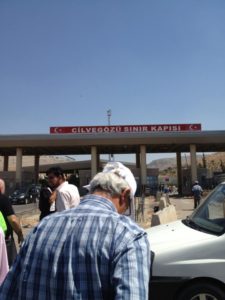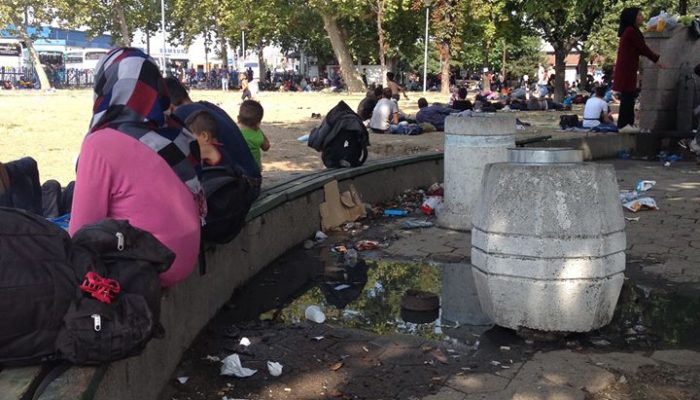Broken Promises: Historic Authoritative Rule and Selective Enforcement of International Law Fueling a Surge in Human Trafficking – the Case of Syria
The European Union’s (EU) approach in addressing the European Refugee Crisis was largely driven by security (home affairs), diplomatic concerns, and the interests of EU member states, while marginalizing non-security related policies despite a call by the EU Commission and High Representative for ‘coherence’ among coordination between EU policy sectors. As a result, EU responses prioritized member states’ security prerogatives over other policy approaches and international law. A hallmark of Western democracies is the effectiveness of functioning legal systems, but the inability of the EU to coordinate and respond to the 2015 refugee crisis revealed the limitations of the western legal system.
 This study’s main research question asked ‘what factors motivated Syrians to migrate to Europe by extra legal means?’ (see Table 1 and 2). The study yielded a total of 151 responses, but not all participants responded to all three questionnaire sections. Participants from European countries equaled 110, while respondents from the Middle East and North Africa (MENA) totaled 41. Age and gender demographics were skewed towards males (89% N=134), born between 1985 to 2000 (55% N= 82). Participants residing in Europe overwhelmingly arrived in 2015 (47% N=63).
This study’s main research question asked ‘what factors motivated Syrians to migrate to Europe by extra legal means?’ (see Table 1 and 2). The study yielded a total of 151 responses, but not all participants responded to all three questionnaire sections. Participants from European countries equaled 110, while respondents from the Middle East and North Africa (MENA) totaled 41. Age and gender demographics were skewed towards males (89% N=134), born between 1985 to 2000 (55% N= 82). Participants residing in Europe overwhelmingly arrived in 2015 (47% N=63).
| Table 1: Syrians’ Views of International Law | No | N= | Yes | N= |
| I believe the international community did a good job regarding the relocation of Syrian refugees (N=120) | 61% | 73 | 39% | 47 |
| The United Nations helped Syrian refugees seek asylum in other countries outside the region. (N=120) | 69% | 83 | 31% | 37 |
| The international community enforced the right of Syrians to seek asylum in countries outside of the region. (N=120) | 53% | 64 | 47% | 56 |
| The international community has the ability to protect the human rights of Syrian refugees but chooses not to. (N=120) | 34% | 41 | 66% | 79 |
| The western legal system helped Syrian refugees (N=120) | 31% | 37 | 69% | 83 |
| I felt betrayed by the promise of justice by international law (N=120) | 52% | 62 | 48% | 58 |
| I felt betrayed by the lack of action by the international community to help the Syrian people (N=119) | 28% | 33 | 72% | 86 |
Quantitative and qualitative methodologies were utilized to provide a nuanced understanding of four dependent variables: 1) German and Scandinavian states offering asylum to Syrians without providing legal means of transportation, 2) experiences of Syrians living under an authoritative state where the legal system is often ineffectual and extra legal means are employed ubiquitously, 3) Syrian’s lack of confidence in the application international law, and 4) deciding to remain in the region based on a belief the European states would not ensure their human rights, particularly religious freedoms.
The lack of credibility of international law was a major cause in seeking asylum in Europe by extralegal means.
Syrian refugees surveyed felt betrayed by international law (78%, N=92), which led to a lack of confidence in the international legal system (69% – N=83). The ineffectiveness of international law was reminiscent of the Syrian legal system that was not ubiquitously applied equally (54%, N=57), and viewed as ineffectual (56%, N=42), resulting in Syrians circumventing the law to acquire life necessities (90%, N=87). The lack of credibility of international law was a major cause in seeking asylum in Europe -by extralegal means (78%, N=92). When the law fails to function and there is a historic dysfunction of the law, extra legal means are normalized as acceptable methods of acquisition (see Tables 1 and 3).
| Table 2: Why Syrians Chose to Seek Asylum in Europe | No | N= | Yes | N= |
| I had no future if I stayed in the region (N=93) | 17% | 16 | 83% | 77 |
| I was afraid of being drafted into the Syrian army (N=92) | 20% | 18 | 80% | 73 |
| I wanted to provide money for my family (N=93) | 50% | 47 | 50% | 47 |
| I wanted to find a job (N= 93) | 43% | 40 | 57% | 53 |
| I wanted to continue my education (N=93) | 43% | 40 | 57% | 53 |
| I wanted to bring my children/family to Europe to have a better life (N=93) | 37% | 34 | 63% | 59 |
| The German, Swedish and Norwegian offer of asylum to Syrians influenced my choice to migrate to Europe (N=92) | 48% | 44 | 52% | 47 |
| The German Swedish and Norwegian offer of asylum to Syrians did not provide a legal means of transportation and influenced my decision to seek alternate routes to Europe (N=91) | 29% | 26 | 71% | 65 |
| I lost faith in the international community’s ability to help ensure my human rights in the region (N=93) | 16% | 15 | 84% | 78 |
| No one was coming to save me, so I had to find a way to save myself (N=92) | 10% | 9 | 90% | 83 |
Participants from MENA reported by 100% (N=21) remained in the region because they believed they would not be granted full human rights in a European country, while 96% (N=19) expressed losing faith in the effectiveness of international law as a factor in remaining in the region.
| Table 3: Law and Syrian Society | No | N= | Yes | N= |
| In Syria the laws are applied equally to citizens (N=97 | 54% | 57 | 46% | 49 |
| Syrians lived under an authoritative state where the legal system is often ineffectual (N=96) | 56% | 42 | 44% | 5 |
| Often in Syria people have to go outside the law to get gain access to life necessities or to allow them to be upwardly mobile (N=97) | 10% | 10 | 90% | 87 |
| Often extra-legal means are employed ubiquitously in Syria (N=97) | 54% | 52 | 46% | 45 |
These findings indicate the surge in human trafficking seen in 2015 may have been fueled by: 1) a perception of Syrian refugees’ lack of efficacy in the application of international laws regarding migration and human rights; 2) a historic experience of the ineffectiveness of the legal system in Syria; 3) an inability to legally seek asylum in Europe; and 4) the inability of European countries to balance the needs of security and international law.
Anisa Abeytia is a research and policy professional focused on Syria, integration and the refugee crisis in Europe. She presents her work internationally and writes regularly on the topics of Syrian refugees, the Middle East and the integration of Muslims and Arabs in Europe.
This research paper was presented at the Quality of Government Institute & the Interdisciplinary Corruption Research (ICR) Third Interdisciplinary Corruption Research Forum, “Mechanisms of Corruption: Regional perspectives and potential solutions” (June 7th – 9th, 2018), at the University of Gothenburg, Sweden.
